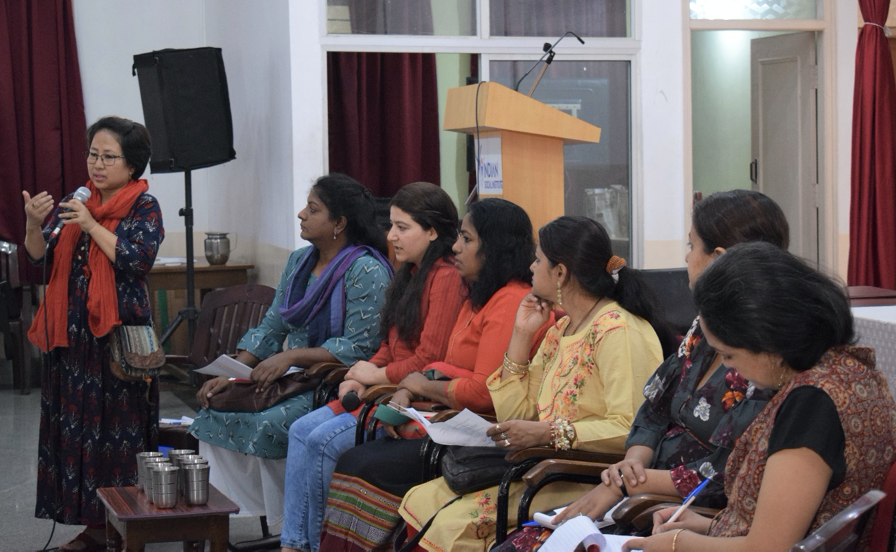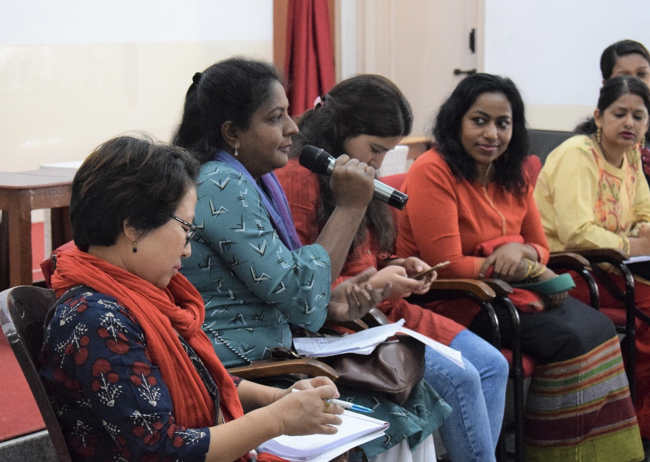DAY 3 : 09 February 2020
SESSION 4: 9.30 – 11.30 am
Fixing the Ethics of ‘Fixer’ Journalism
National and international journalists are descending on the states of north-eastern India, Kashmir and rural south India as the politics emanating from these places resonates across the world. These journalists often look for “fixers” – the popular but pejorative term for a local producer or coordinator who is expected to arrange meetings, organise logistics, and often also provide valuable perspectives on the complex subjects involved. These relationships are often fraught. If the visiting journalists make mistakes in their reporting, journalists based in these areas, who are the ones usually hired to assist them, are vulnerable to retaliatory action. Local journalists often feel exploited as they help “parachute” journalists in various ways but get little professional credit, respect or compensation for their time, energy, knowledge and contacts.
The session explored the ethics and power imbalance of parachute/fixer journalism and addressed questions such as: What are the gaps in journalism done this way? How can the media front real experts, keeping the voice of those affected while also providing a larger perspective? What kinds of terms/contracts can local journalists practically negotiate? What is a better name for this job? What are the good existing models that we can replicate? Are media collaborations with potentially fairer terms of engagement viable?
Moderators: Thingnam Anjulika and Kavin Malar
Initiators of the discussion: Raihana Maqbool (Kashmir), Shahina KK (Kerala), Anuradha Sharma (West Bengal), Sushmita Goswami (Assam), Sumita Jaiswal (Bihar).
Thingnam Anjulika, co-moderator of the panel, began the session laying out the basic problem. “We need our stories to go out, and we need collaboration. But many times, we have found that local journalists are not respected for their expertise, time and knowledge. Sometimes the outsider journalist takes the story and writes it up beautifully, but sometimes it is written with half knowledge. Sometimes we are upset at the way they treat people in our states.
Explaining the meaning of ‘parachute journalism’ she said the need for ‘fixers’ arises because most journalists who parachute in do not belong to the area they are covering and do not have local knowledge. According to her, discussions about the practice of parachute journalism become important when local contributors are not treated with the respect and appreciation they deserve for their contributions and/or when the journalist from elsewhere goes back and writes a story based on partial knowledge and understanding, which creates tensions locally.

The term ‘fixer’ is not the best way to describe local contributors, said co-moderator Kavin Malar. She urged panellists to refer to them as local contributors or co-ordinators instead. She also pointed out that the relationship between local contributors and their sources can sour when parachute journalists put out a problematic story.
Raihana Maqbool recounted the incident of a female journalist who had approached a senior Kashmiri journalist after the August 2019 clampdown in the state in an effort to contact local sources and gather local knowledge for stories. In the end she did not reimburse him for his contributions and even expenses. She said this was not an unusual situation: local journalists based in Kashmir are often not paid for their contribution despite the fact that a large number of parachute journalists come to the Valley looking for stories. To make matters worse, many of these journalists often misreport the situation as well, and this can even endanger local journalists known to have helped them with sources, etc. She suggested that a written agreement is required to minimise the possibility of reneging on oral agreements and misreporting.
Anjulika pointed out that outside journalists seek out the senior-most journalists to benefit from their sources, knowledge and opinions but do not respect or reward them for the help they render. There are problems with seeking permission, getting a written agreement, deciding on payment. Visiting journalists should be sensitive enough to realise that even if the local journalist does not specifically ask for money, the outsider should understand that this is an invaluable service that deserves compensation.
Sahina KK shared her experience of being approached by a reporter working for an international newspaper for help with a story on people from Kerala joining the Islamic State (IS) organisation. The international journalist mistook the flag of the Indian Union Muslim League (IUML) for the Pakistani flag and drew conclusions based on that mistake in her report. According to her, most international journalists lack proper knowledge and clear understanding of the places and people they try to cover.
It has been suggested that local journalists should ask for bylines, not just payment. However, not all local journalists may want a shared byline because they cannot be sure that the story will be reported correctly and it is they who are answerable to their sources. Shahina explained that she has reservations about sharing a by-line since the visiting journalists often come up with a story that can land local contributors in trouble. She suggested that a system of footnotes, like the one that exists in academia, may be a better way to acknowledge the contributions of local journalists. During the question-answer session, a participant suggested that the problem could be addressed by requiring that a playback copy should be shared with the local contributor before the story is published. But Shahina pointed out that local journalists do not usually have the bargaining power to insist on such conditions.
The reality that parachute journalists often have a fixed narrative in their mind and approach the sources that support this narrative was brought out by Sushmita Goswami, based in Guwahati. According to her, visiting journalists often release reports that can cause damage to the local people as well as the local journalists who have to face the repercussions when the ground reality is not accurately and holistically reflected. Sushmita also talked about another scenario, in which parachute journalists are open to learning about local perspectives but can be misled by local journalists who have a specific agenda. This, too, can lead to gaps in their journalism. Talking about credit and monetary compensation, she said it is currently up to journalists, as individuals, to adhere to ethical practices but the NWMI could also initiate a process to draft guidelines which ought to be followed. The main issue is that there should be more balance in the power equation between visiting and local journalists. A better understanding of the relationships between local journalists and local sources, and more awareness of the importance of ensuring that the stories resulting from the collaboration are both accurate and balanced, are also required.
Anuradha Sharma, based in Siliguri, highlighted the pact that often exists between freelance journalists and suggested that monetary compensation may not be important in such cases. She discussed the politics of who gets to tell the story and the power equations within organisations. “My approach is to push for collaborative journalism. Look at the example of hostwriter.com. We have to push for collaborations with local reporters to tell the story. There will be issues. Situations will keep arising but if we see collaboration as a way to tell stories we can get around the problem,” she said. Some big organisations do want local reporters to tell the story and there are networking sites for journalists that allow them to find partner journalists who can collaborate in a story. She shared the example of Paul Salopek walking the human migration path with a local walking partner who gets to share the byline with him as an example of fair partnership.
Sumita Jaiswal, based in Patna, discussed the entangled nature of the ethics of parachute journalism and media ownership. She pointed out that when journalism has become more of a business, and political leaders are involved in media companies, newspapers follow policies designed to suit a particular readership and ensure popularity. These policies, along with the pressure put by the management on the editorial decision-makers if the advertising department has issues with anything that is reported, do not allow journalists to bring in other perspectives. According to her, each reporter’s individual position and capacity within an organisation becomes more important in this context. She suggested that the NWMI should propose a written agreement about payments to help network members, who often have problems in negotiating terms and ensuring proper monetary value for their contribution.

During the discussion that followed, the idea of introducing a consent form for sources was debated upon. Many were of the opinion that such a practice would be one-sided and enable journalists to evade accountability. It could result in sources ending up in a vulnerable position, too.
Narrating her experience as a local coordinator, Rajashri Dasgupta said she has found that consent forms for interviews did not protect the people interviewed and instead protected only the journalists. She also pointed out that sometimes the photographer or cameraperson would violate the terms of the inadequate consent form by taking photographs of people without their consent. This created a situation where it was difficult to know what could be done once “the arrow has been shot”.
Linda Chhakchhuak recounted her experience, when she had gone to Arunachal Pradesh for a story a long time ago. “On the way back, I was taking pictures,” she said, “when a man came up to me and posed for a photograph, which I took. He then asked for Rs 5,000, telling me: you take photographs and earn money, so give us some.” According to her, what he said was true.
As for payments, some participants said that it is culturally difficult for Indian women journalists to negotiate. Anjulika pointed out that many people in the regional media who work as ‘fixers’ do not know how the system works, let alone about the option to demand a joint byline, with playback, etc.
There was agreement that NWMI could consider developing a template that could help frame agreements between parachute journalists and local contributors for the benefit of members.


